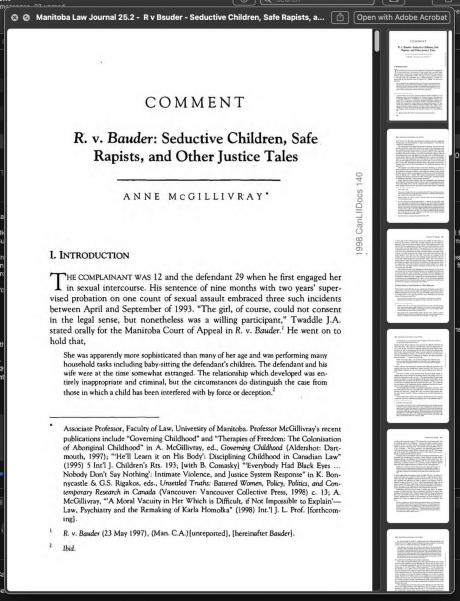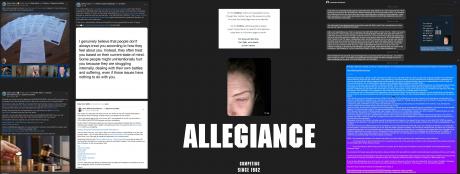Drift the Grift — Fraud is too Common in Canada: Nearly Half (43%) of Canadians Have Knowingly Been Victimized by Fraud or Scams, in their Lifetime
Editor's Note:
- This is fucking hilarious. Have you ever heard of drifting, and then applied such an understanding to the legalistic model of grifting? Have you heard about someone so obsequiously driven, that they jump into the fire in order to avoid the discomfort of the frying pan?
- You do realize that tryin' to con a reformed ex-con is basically like tryin to run a grift on someone who understands nuance and subtlety? That criminal theft and extortion are actually worse than civil forfeiture and disclosure? Was this possibility planned for by the architect of complications?
Toronto, Ontario, February 17, 2023 — A new Ipsos poll conducted on behalf of the Chartered Professional Accountants of Canada reveals that fraud is perhaps more common in Canada than we might think, as nearly half (43%) of Canadians claim to have knowingly been victimized by fraud or scams at some point in their lifetime. And contrary to conventional stereotypes, older Canadians (55+) are among the least likely to report having knowingly been victimized by fraud or scams at some point in their lifetime (31% vs. 50% aged 18-54). By comparison, almost two-thirds (63%) of younger Canadians (aged 18-34) admit that they’ve knowingly been the victim of fraud or scams at some point in their lifetime. Credit card fraud is most commonly reported (21%), followed at a distance by debit card fraud (8%) or online phishing scams (8%).
The Internet dominates modern life in Canada –virtually all (96%) Canadians engage in online activities and virtually everyone (97%) has a debit and/or credit card. Most Canadians engage in online banking (78%) and/or manage their credit cards online (72%). Online banking and shopping are now the norm. Most notably, as many as three in ten (29%) admit they are now making large purchases online (i.e., household appliances, vacations, vehicles, etc.) –a figure which rises to slightly above one-third (35%) among the 18-34 cohort.
With so many Canadians’ transitioning their banking (and shopping behaviours) to online platforms, it is perhaps not surprising that fraud and online scams have become a little “too common” in modern Canada. Given the prominence of online banking and shopping in modern life, it is alarming that fewer than half (42%) say they receive email or text alerts for every transaction on their credit or debit card which can help to identify fraudulent charges more quickly.
The vast majority (91%) of fraud victims say they found a shoulder to cry on and told someone else about it. Most were not able to bring themselves to share the experience with loved ones, however, as only about one in four (27%) report telling family members about it and even fewer (22%) shared their experience with friends. A majority (54%), albeit a surprisingly slim one at that, claim to have reported the incident to their financial institution.
About the Study
These are the findings of an Ipsos survey conducted on behalf of the Chartered Professional Accountants of Canada. Fieldwork was conducted between January 3 and 5, 2023. A total of n=2,005 Canadians aged 18+ participated in the survey which was fielded via the Ipsos’ online omnibus. The combined data has been weighted by age, gender, education and region to ensure the sample composition reflects the Canadian population. The precision of Ipsos online surveys is calculated via a credibility interval. In this case, the sample is considered accurate to within +/- 2.5 percentage points had all Canadians aged 18+ been surveyed.
For more information on this Factum, please contact:
- Sean Simpson
Senior Vice President, Ipsos Public Affairs
+1 416 324 2002
Sean.Simpson@ipsos.com
- James Cottrill
Senior Account Manager, Ipsos Public Affairs
+1 416 324 2900
James.Cottrill@ipsos.com
About Ipsos
Ipsos is the world’s third largest market research company, present in 90 markets and employing more than 18,000 people.
Our passionately curious research professionals, analysts and scientists have built unique multi-specialist capabilities that provide true understanding and powerful insights into the actions, opinions and motivations of citizens, consumers, patients, customers or employees. We serve more than 5000 clients across the world with 75 business solutions.
Founded in France in 1975, Ipsos is listed on the Euronext Paris since July 1st, 1999. The company is part of the SBF 120 and the Mid-60 index and is eligible for the Deferred Settlement Service (SRD).
ISIN code FR0000073298, Reuters ISOS.PA, Bloomberg IPS:FP







Comments